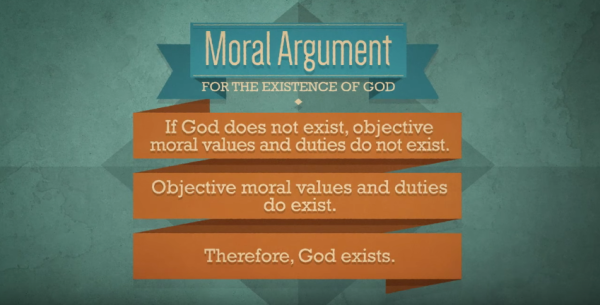What Do You Think of the Moral Argument for God?
by Brandon Vogt
Filed under Morality, The Existence of God
NOTE: We recently kicked off a new series of posts, each introducing a popular argument for or against God, followed by open-ended discussion. The goal is not to offer a thorough defense or refutation of the argument in the original post, but to unpack it together, as a community, in the comment boxes. The first argument we discussed was Alvin Plantinga's modal ontological argument for God, then we looked at the kalam cosmological argument. Today, we'll look at the moral argument for God.
The moral argument is one of the oldest and most-discussed arguments for God. Here's a short video from William Lane Craig's Reasonable Faith ministry explaining it:
The video presents the argument like this:
Premise 1: If God does not exist, objective moral values and duties do not exist.
Premise 2: Objective moral values and duties do exist.
Conclusion: Therefore, God exists.
As with the kalam cosmological argument, the argument appears deceptively simple. The logic is clear and airtight—I'm not aware of any philosopher, theist or non-theist, who denies the logic.
Most of the discussion, therefore, centers on three elements: the meaning of "objective moral values and duties", the truth of premise one, and the truth of premise two. Most critics who reject this argument take issue with one of those three elements.
For example, Sam Harris, in his book The Moral Landscape, attempts to circumvent this argument by refuting premise one. He does so by defining morality as that which contributes to the well-being (or flourishing) of sentient creatures. If it produces more flourishing, it's good. If it mitigates flourishing, it's bad. Defined this way, Harris claims, morality does not require God since science can reveal what is good by identifying things that increase or detract from our well-being.
The problem, however, as William Lane Craig and others have noted, is that Harris equivocates the meaning of "good" (and thus the definition of morality.) On Harris' moral view, something is "good" if it contributes to overall human flourishing, if it yields a positive, pragmatic benefit. But this is different than saying something is morally good. Harris' view is more like saying you made a "good" chess move or you did a "good" job on that portrait. Those examples do not refer to objective moral goodness, just pragmatic goodness. But it's moral goodness that the original argument refers to and claims is inexplicable without God.
So what do you think? Is the moral argument a sound proof for God? If not, how does it fail?
Related Posts
Note: Our goal is to cultivate serious and respectful dialogue. While it's OK to disagree—even encouraged!—any snarky, offensive, or off-topic comments will be deleted. Before commenting please read the Commenting Rules and Tips. If you're having trouble commenting, read the Commenting Instructions.













